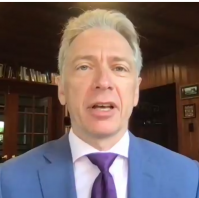
Two well-recognized IP experts share thoughts during “InventorCon ‘21”
By Tom Ballard, Chief Alliance Officer, PYA
As noted in this mid-April article in teknovation.biz, the Inventor’s Network KY held “InventorCon ‘21” virtually at the end of last week, and we had the opportunity to join a couple of the sessions on two of the three days. Both we focused on aspects of managing intellectual property (IP).
“Inventors literally saved the world,” said Andrei Iancu, former Director of the U.S. Patent and Trademark Office, in a Saturday morning session. Obviously, he was referring to the rapid development and delivery of multiple vaccines to combat COVID-19.

“What would the world have done if this had occurred 10 or 20 years ago,” Iancu asked? He was referring not only to the COVID-19 vaccines, but also to the Zoom and Whova technology platforms that were used to deliver the “InventorCon ‘21” event.
“Intellectual property incentivizes innovation,” Iancu reminded those viewing the session. “You need to always consider intellectual property rights,” adding that it is not just patents but also trademarks, copyrights, and trade secrets among others. “If you do not think about it (IP protection) early on, it might be too late when you do.”
He cited Article I, Section 8, Clause 8 of the U.S. Constitution that granted Congress the powers to establish rules governing patents and copyrights. “That’s how important they (the two matters) were to the founders of this country,” Iancu said.
On the first day of the conference, we joined a session with Gene Quinn, President and Chief Executive Officer of IP Watchdog Inc. Moderated by Leo York, one of the organizers of “InventorCon ’21,” it was a lively, rapid fire, and insightful Q&A about a variety of IP issues.

Quinn started the session with a discussion about board game inventors and a key question: “Should they file a provisional patent or a copyright?” His answer was both, citing the well-known game named Monopoly. “Think of all the ways the game can be played in long and short form,” Quinn said in response to the patent portion. As far as copyright, he said to think about things that are protectible like the design of the board.
Here are some of his other thoughts based on the questions that were asked.
- Should prior art be included in a provisional application? “I would not do that,” Quinn said, adding, “You need to know about it,” however. “There are downsides to doing it (including in a provisional application). You are admitting what the prior art does.” His advice was to make comprehensive notes so you know how those claims compare with your invention, but don’t submit.
- “Don’t ever characterize your invention as simple,” Quinn said.
- Noting a recent change in the patenting process, he reminded attendees, “We live today in a first to file system, (so) do it (filing) with deliberate speed, moving as fast as you can.”
- On the matter of a perfect patent, Quinn invoked that old adage: “Don’t let the perfect be the enemy of the good.”
- Finally, he said he was a fan of a design patent because it is cheaper and easier to secure. “It protects the way it looks and not the way it acts,” Quinn advised.
Like what you've read?
Forward to a friend!

